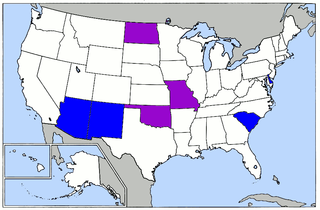
Mini-Tuesday was the name given to the February 3, 2004 U.S. presidential primary where several states, which to that point had participated in "Super Tuesday," cast their votes for the Presidential nominees of the 2004 Presidential election.[1][2] Mini-Tuesday was also called Super Tuesday I (with the March Super Tuesday called Super Tuesday II, in reference to their respective chronological order).[1] With the large number of states moving their election dates up to Mini-Tuesday for the 2008 election cycle, pundits have largely shied away from using the term again, instead choosing to reappropriate the term "Super Tuesday" to better represent the primaries held on that approximate date.[citation needed] The date is also known as "Super Duper Tuesday," "Giga Tuesday," and "Tsunami Tuesday," among others, with the term "Mini Tuesday" falling to apparent disuse for the time being.[3]
In 2004, U.S. presidential primary elections occurred in Missouri, South Carolina, Arizona, Oklahoma and Delaware. Presidential caucuses were held in New Mexico and North Dakota. The Republican primaries and caucuses were virtually uncontested as incumbent President George W. Bush faced no substantial opposition. The Democratic primaries and caucuses were contested between retired General Wesley Clark of Arkansas, former Governor Howard Dean of Vermont, Senator John Edwards of North Carolina, Senator John Kerry of Massachusetts, Congressman Dennis Kucinich of Ohio, Senator Joseph Lieberman of Connecticut, and the Reverend Al Sharpton of New York.[2] Of the seven Democratic primaries contested, five were won by Kerry, reinforcing his status as frontrunner for the 2004 nomination.
- ^ a b
"Q&A: US primary elections". BBC News. 2008-01-10. Retrieved 2008-01-12.
In 2004, Super Tuesday split in two. There was a Mini-Tuesday (or Super Tuesday I) on 3 February, followed by a Super Tuesday II on 2 March.
- ^ a b Corn, David (2004-02-04). "Mini-Tuesday: Ten Talking Points". The Nation. Retrieved 2008-01-12.
- ^ Schneider, Bill (2007-02-07). "It could all be over after 'Super Duper Tuesday'". CNN. Retrieved 2007-06-03.
© MMXXIII Rich X Search. We shall prevail. All rights reserved. Rich X Search
